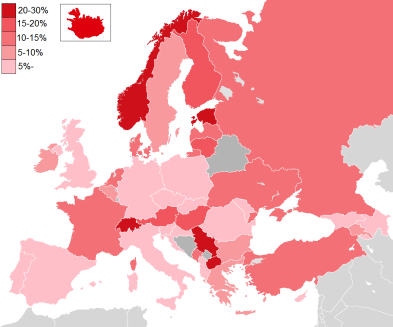Rafael J.M. Herrero is a second year student in the MFA program
 Populism is rooted in a story plot, the classic “us against them.” The evil elite and the abused victims. We have all heard “the system is rigged, folks,” in the last few weeks. While populism is used to brand politicians such as Donald Trump or Bernie Sanders, it seems they have nothing in common other than their popularity among voters. The term also refers to left-wing, pro-Cuban parties of Latin America. In Europe, populism is used to label political formations on the far right, Marine Le Pen’s National Front in France and Victor Orbán’s Fidesz in Hungary. The word is also thrown around in Brexit debates. Then there is the populist Rodrigo Duterte in the Philippines. Worldwide, populism is on the rise. All of these contrasting movements can be rightfully marked as populists. Populism is not an ideology, but a technique.
Populism is rooted in a story plot, the classic “us against them.” The evil elite and the abused victims. We have all heard “the system is rigged, folks,” in the last few weeks. While populism is used to brand politicians such as Donald Trump or Bernie Sanders, it seems they have nothing in common other than their popularity among voters. The term also refers to left-wing, pro-Cuban parties of Latin America. In Europe, populism is used to label political formations on the far right, Marine Le Pen’s National Front in France and Victor Orbán’s Fidesz in Hungary. The word is also thrown around in Brexit debates. Then there is the populist Rodrigo Duterte in the Philippines. Worldwide, populism is on the rise. All of these contrasting movements can be rightfully marked as populists. Populism is not an ideology, but a technique.
Danielle Albertzalli, director of political science and international studies at the University of Birmingham, and Duncan McDonnell of Griffith University state that populism “pits a virtuous and homogeneous people against a set of elites and dangerous ‘others’ who are together depicted as depriving … the sovereign people of their rights, values, prosperity, identity and voice.” According to Ernesto Laclau, Professor of Political Theory at the University of Essex and world reference on populism, the meaning “is not to be found in any political or ideological content, but a particular mode of articulation…” which, in other words, means that populism is a way of playing the political field. Populism, therefore, is not an ideology and does not have a specific program or content: it is a technique.

The populist style is then assembled with ideology. According to The New Yorker, populist rhetoric offers “simple answers to difficult questions” and often has “a conspiratorial and apocalyptic bent,” as it is frequently based more on emotion than reason. Right-wing populism, like that of Donald Trump in the U.S. or Marine Le Pen in France, spew a nationalistic and xenophobic discourse, considering foreigners and immigrants to be a threat to national prosperity. The left-wing populism of Occupy Wall Street opposes a system favoring the stock market while chipping away at social safety nets. All forms of populism center on a call of the good masses against an evil elite.
Often, populist politicians voice opinions that are deemed too ugly to be uttered by common individuals. Their followers boast that the party leader finally “tells it like it is.” The Economist says that populists believe that instead of “expressing obnoxious prejudices, they are voicing truths which others are too politically correct to admit.” It is unsettling that these ideas, sometimes racist, misogynistic, and homophobic, have been lurking in silence in the minds of so many voters in our so-called “advanced” societies.
Populism might be an effort to help the masses use the democratic system to get back at an oligarchy, but more often than not, populism blurs the limits between leader, party and government. Supporters of populism consider anyone with a different point of view is speaking for “special interest groups.” They accordingly reject the legitimacy of political opponents and attempt to circumvent the separation of powers. In this respect, populist movements can be shocking or even frightening, and raise uncomfortable questions about our modern forms of democracy.
For being such a vague and elusive term, it is curious that those branded as populists do not want to be considered so. If populism is indeed an opposition of the masses against the elite, populism could be reasonable and even desirable: it could form a more equitable society. However, the utilization of confrontation and demagoguery that characterizes populist movements leads to a polarized society that does not favor progress through inclusive, democratic negotiations.
